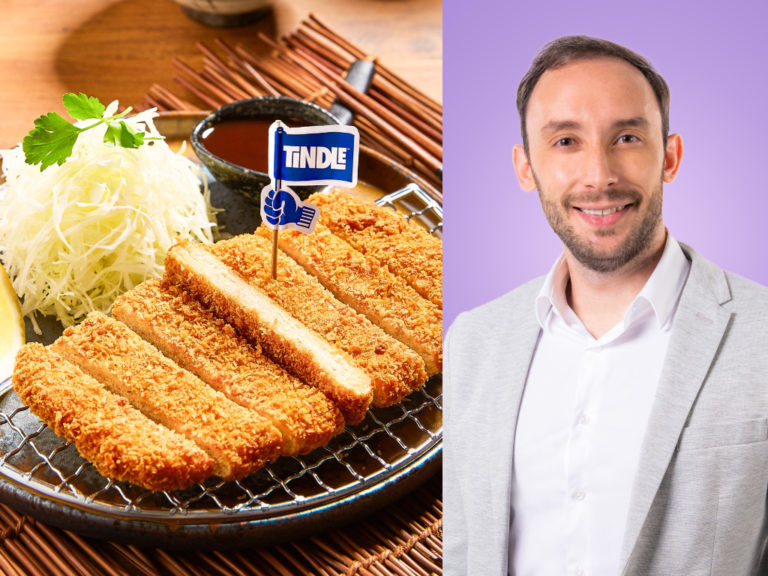RIO DE JANEIRO, BRAZIL – Serving a soy-based chicken at the table that offers the same flavor and versatility as chicken thigh seems quite a challenge, even more so when it is a high protein, high fiber, low carbohydrate, free of genetic modification and, of course, zero cholesterol product.

It sounds like a hoax, but this is the precise combination that Brazilian André Menezes proposes to over 40 restaurants on the other side of the world, more precisely in Singapore, Asia.
Next Gen, developer of TiNDLE – as the brand’s vegetable chicken is known -, received a US$10 million investment, in what was the largest seed investment round in history for the development of plant-based food, the kind that mimics another product.
The 33-year-old entrepreneur’s main goal is to manufacture the plant-based chicken in Brazil, but he faces obstacles such as currency devaluation, import taxes and the lack of a local partner for large-scale production.
The entrepreneur graduated in Mechanical Engineering from UNICAMP and made a career at BRF, a giant in the Brazilian food market. There, he worked in the supply chain area, in charge of managing the group’s logistics. Menezes says that in the company he understood the whole chain process, from the grain that feeds the cattle to the final stage of the business: consumers.
Knowledgeable in techniques and processes, the engineer reached the conclusion that environmental damages during the process are tremendous. In the specific case of chicken, many parts of the animal that are not interesting for human consumption are wasted, such as feathers. In addition to this waste, the process requires the use of a series of other products on a large scale, such as medicines, food, water, transport between farms, and the energy used by the production workers.
“It was very shocking to me. It made me wonder if it really made sense,” he says. Faced with these issues, the entrepreneur decided to pursue a new career path, but miles away from Brazil.
While still at BRF, André Menezes moved to Singapore with the aim of leading a joint venture of the company with Sats, the largest meat distributor in the country. However, in 2019, he decided to interrupt his cycle in the company to found Next Gen the following year, in partnership with German Timo Recker.
The focus is to produce plant-based foods that can convey the flavor and texture of meat. With the German’s US$2.2 million investment, work began in March 2020, amid the onset of the Covid-19 pandemic.
TiNDLE was developed in an empty kitchen precisely because of social isolation. “It is impossible that 30 years from now the meat business will still be responsible for our food, that can’t be the only answer,” he argues.
From the moment the proposal was developed, the brand, the image, and the food production process were created in Europe, in a joint effort, without the need for the entrepreneurs to leave Singapore. The fruits were harvested in February this year, when Recker and Menezes secured the US$10 million investment round, a milestone for the sector.
TiNDLE made its global debut in Singapore in March 2021, and has since joined the menu of over 40 restaurants, including those of Michelin-starred chefs. Now, after the million-dollar contribution, the foodtech is starting its international expansion to 3 major cities in Asia: Hong Kong, Macau, and Kuala Lumpur, where it is expected to be launched on June 24.
The global plant-based segment should be worth US$85 billion by 2030, according to Swiss bank UBS. In Brazil, the number of vegetarians grew by 75% between 2012 and 2018, according to Ibope. Also according to the institute, 60% of all people interviewed would prefer to buy plant-based products if the price range was similar to that of animal products in the same category.
Although the Brazilian entrepreneur in charge of TiNDLE’s project wishes to offer the product in his country, some obstacles weigh against this personal wish. “We believe that the four largest markets in the long term will be the United States, Europe, China, and Brazil,” says Menezes. On the other hand, the main obstacle in relation to Brazil is the devaluation of the Brazilian real against the dollar, in addition to the exorbitant import taxes – factors that would make the product considerably more expensive.
The entrepreneur’s goal is to develop a food product at a fair price that can be consumed by the population in general, not only by the wealthy. The ideal scenario for TiNDLE to enter the country would be to build its own plant in Brazil, but it still lacks partners to do so.
“Today, the way it is designed, the price for the end consumer would be astronomical,” he adds. For now, Menezes can only dream of better conditions in the future to bring his creation to his home country.

